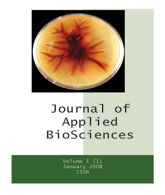Journal of Applied Biosciences (J. Appl. Biosci.) [ISSN 1997 - 5902]
Volume 33: 2027 - 2036. Published September 9, 2010.
Assessment of Kenyan public perception on genetic engineering of food crops and their products
Anunda Henry N., Njoka Fredrick M., Shauri, S. Halimu.
Kenyatta University, P.O Box 43844, Nairobi, Kenya.
Corresponding Author e-mail: nelkaru2000@yahoo.com
ABSTRACT
Objectives: To assess public perceptions towards Genetically Modified (GM) Crops and foods in Kenya. Specifically, to: (1) find out Kenyans’ level of awareness and knowledge of GM crops and foods; (2) find out the attitudes of Kenyans’ towards GM crops and foods in relation to their demographics (age, gender, educational qualifications and their agro-ecological regions and (3) give suitable recommendations from the findings on the future of GM crops/foods in Kenya.
Methodology and Results:A survey was carried out in Kenya covering all the country’s 8 provinces between November 2007 and June 2008, targeting the adult civilian population (aged 18 years or older). The objective was to attain a sample size of over 700 subjects so as to achieve a sampling error rate of +3.7 percent. Four clusters were set to ensure a balanced representation of all stakeholders in the country; A (general consumers), B (farmers), C (academia), D (resource persons). In addition, efforts were made to ensure that the sample drawn for this study was representative of the Kenyan population through Simple Random Sampling, Systematic Sampling, Convenient and Snowball Sampling as was appropriate. The data was obtained via self completion questionnaires. Specifically, the survey instrument was designed to gather information on the public’s general awareness, knowledge and attitudes on various issues pertaining to the use of genetic engineering on crops and food production, public approval of the use of genetic engineering and public views about various private, foreign and public institutions associated with biotechnology research and product development. The survey also sought some information on the respondent’s economic demographic and value attributes, including respondent’s views about scientists, companies and government regulators associated with genetic engineering products. The response/cooperation rate was 68%. Overall, 58%, of the respondents had positive perceptions and believed that genetic engineering of crops would alleviate hunger and malnutrition and reduce poverty in Kenya.
Conclusions and recommendations:Results of the study indicate that acceptance of genetically engineered food crops is related not only to the public’s demographic characteristics but also to their value attributes. Younger people were generally more optimistic about GM crops/ foods. However, female respondents were clearly less supportive of GM crops/ foods than were their male counterparts. More-educated individuals and those with higher levels of scientific knowledge were more optimistic about introduction of GM crops and foods in Kenya. The results suggest the need for a well designed and effective program to educate the public about various issues relating to the use of genetic engineering in agricultural and food production. Scientists need to communicate with the public at large with complete information and in a proactive way. In order to enhance public trust, all interested parties, including those opposed to GM foods, should be involved in the decision making process surrounding the issues or concerns associated with genetic engineering.
FULL PAPER [PDF AVAILABLE HERE]
